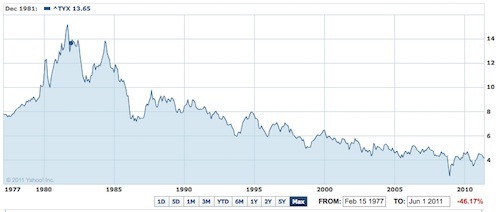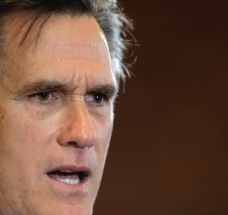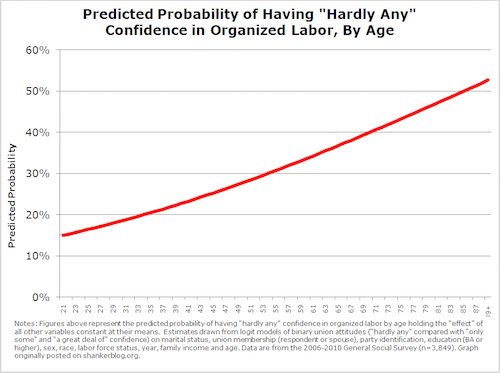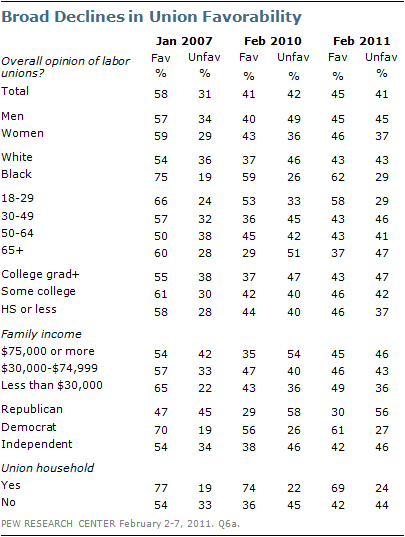Matthew Yglesias's Blog, page 2272
June 16, 2011
Desire For Government Activism Making a Comeback
Greg Ip compiles a fascinating chart based on years worth of WSJ/NBC polling data:
[image error]
It's kind of difficult to make out a pattern here, but I agree with Ip that this seems to indicate that we've reached Peak Tea Party.


Attack Of the Bond Vigilantes
European debt woes pushing US bond yields down toward record lows:

Similar stuff happening with other safe haven debt assets like German and British bonds. With the US and UK suffering from high unemployment and a big output gap, issuing more of the bonds that market demands and spending the money to reduce unemployment should be a no brainer. Instead we're talking about debt reduction and austerity. It's insane.


Mitt Romney Is Not Unemployed

Tone deafness aside, when Mitt Romney tries to say that he feels the pain of the jobless because he's "also unemployed" it's worth pointing out that he actually isn't unemployed. He's just not working. It's not really the same thing.
An unemployed person is a person who's looking for a job and not finding one. Many people also just happen to not be in the labor force. And the longer an economy lingers with inadequate aggregate demand, the more people end up dropping out of the labor force. Now if you're a multi-millionaire like Romney, there's nothing wrong with being out of the labor force and living on your investment income. But for lots of people dropping out of the labor force means trying to subsist on disability benefits, or relying on family for support, or living on the rather meager Social Security early retirement benefit. It represents not only a big drop in national output, but a big fall in people's living standards.


Another Look At Age And Labor Unions
Matt Di Carlo has an even clearer demonstration of the strong relationship between being old and being skeptical of labor unions, this time using General Social Survey data:

The available data doesn't really let us know if this is an aging effect or a cohort effect, but my speculation is that it's a cohort effect if only because seniority-oriented pay schemes associated with labor unions seem like something that one would come to have more affection for as one ages.


Public Mostly Blame George W Bush For The Economy, Bailing Obama Out Politically

One gripe I hear fairly often around DC is the idea that President Obama has failed to do an adequate job of reminding the public about the disastrous legacy of the George W Bush administration. The latest NBC/WSJ poll showing resilience of Obama's political standing in the face of a bleak national mood suggests that this isn't really the case and the public still puts lots of blame on Bush:
A third reason is that the American public isn't blaming Obama for the current economy, with more than six in 10 respondents still saying he inherited the country's economic problems from his Oval Office predecessor. Also, while a combined 47 percent believe George W. Bush and his administration are "solely responsible" or "mainly responsible" for the current economy, just 34 percent in the poll say the same of Obama and his administration
But that doesn't mean the public is satisfied with the president's economic performance. Just 41 percent approve of his handling of the economy, versus 50 percent who approve of his handling of foreign policy and 54 percent who approve of his handling of the war in Afghanistan..
This, incidentally, is why I think the conservative intellectuals who spent much of this year pining for Mitch Daniels were making a huge mistake. Running against the Bush legacy is clearly a winning strategy at a time when Obama can't credibly claim to have delivered mass prosperity. Being able to literally run against a Bush administration senior economic policymaker would make that strategy much more viable than if Obama has to run against without direct ties.


Striking Claims From Gomory And Baumol
 <
<
It came out in March, but this paper from Ralph Gomory and William Baumol makes some striking claims about the US-China trade relationship:
In a world in which countries can learn and change their productivities, many things can happen that were really not possible in Ricardo's time. We have used the Ricardo Model to reflect this new world. In a world in which productivities are often not fixed by nature but are often acquired we have shown the following possibilities:
That the economic development of a trading partner can be harmful to the home country. Although the effect of that development starts good, it ends badly.
That there is a dominant and dominated relation possible between two countries, a relation that is good for the dominant one and bad for the dominated one.
That a country can attain a dominant position only by having an undeveloped trading partner. This can occur naturally if the trading partner is simply there in an underdeveloped state, or the underdevelopment can be brought about by mercantilist actions that destroy industries.
There is inherent conflict not only between a nation in a dominant position but between that dominant partner and the interests of a two-county world.
While a country cannot gain a dominant position by building up its industries, it can avoid a dominated position and assure a good outcome by developing a particular subset of its own industries and not allowing them to be destroyed.
If I had read this back in March, my response would have been to say that the model is interesting but it's not in fact the case that American manufacturing productivity is declining. On the contrary, despite declining employment productivity is going up. But since that time I've read Susan Houseman and Michael Mandel's essay "Not All Productivity Gains Are The Same." I think you can summarize their point this way. Suppose I have a factory where we make airplanes. We're not going to be making airplanes from scratch. Instead we make airplanes out of airplane parts. And while it used to be the case that we bought our airplane parts from an American factory, now we get them from a Chinese factory and the American factory has closed down. Because my airplane factory's inputs have gotten cheaper, my factory now registers as more productive. And if the Chinese airplane parts factory gets more productive over time, then my factory's productivity increases over time as well. But while these productivity gains are perfectly real—neither the airplanes nor the reduced production costs are an accounting trick—this isn't really the same situation as the one that would obtain if my factory had actually gotten better at building airplanes.


Parking In Minneapolis

I never like to travel without looking up some local parking info, and it seems Minneapolis is at the leading edge of urbanist parking regulation reform:
The adopted revisions respond to policies that call for balancing the demand for parking with other important objectives such as maintaining the city's traditional urban form and encouraging the use of alternative modes of transportation. The revisions recognize that there are negative consequences associated with undersupplying or oversupplying parking. The revisions further recognize that in conjunction with new development or adaptive re-use of existing buildings, requests for variances to reduce the number of required parking spaces have been granted in most instances.
The new regulations are intended to be context sensitive, generally offering greater flexibility related to the minimum number of parking spaces that must be provided with new development while also incorporating reasonable limits on the amount of parking that may be provided. Minimum parking requirements have been eliminated from the downtown zoning districts. Bicycle parking requirements have become much more prominent.
For various reasons, I find automobile parking maximums and bike parking requirements to be more congenial than the more typical mix of car-centric requirements. But I'm not super-excited about the idea that the right way to fix misguided central planning of urban parking is by tweaking the plan. I'd much rather just try to enshrine the idea that people should have as much parking as they want to pay for, but they ought to pay the full price. That strikes me as a politically viable approach to reform that can be sold nationwide and attract a broad coalition. A debate that takes it for granted that we'll either have car-biased central planning or else pedestrian-biased central planning is probably a debate that the proponents of car-biased planning are going to win. The idea that we ought to return to a conception of property rights in which land owners provide parking if they want to, but don't if they don't want to, seems like a clear principle that a broad group of people could endorse.


Spying On Juan Cole
A former CIA official says the Bush administration tried to get him to gather information to discredit Juan Cole. But forget the accusations. Anyone can accuse anyone of anything. Check out the denials:
White House officials did ask about Professor Cole in 2006 [...] Mr. Low, who no longer works in government, did recall being curious about Professor Cole. [...] Intelligence officials confirmed that the assistant sent e-mails to an analyst seeking information about Professor Cole in 2006. They said he had done so at the request of the Office of the Director of National Intelligence, which had been asked by White House officials to find out why Professor Cole had been invited to CIA-sponsored conferences.
The denials seem to me to make the story perfectly clear. Juan Cole was a fierce critic of the Bush administration. At the same time, conservative activists were organizing a campaign in the press to deny him a job at Yale and generally discredit him. And White House officials asked questions about him to people in the CIA, and managers there were "curious" about him. Was anyone brazen enough to do anything illegal? Or did they merely stick to a "will no one rid me of this meddlesome priest" strategy of trying to get someone else to do something illegal on their behalf without actually crossing any bright legal lines? No doubt we'll never know. But they were curious. They were asking questions.


Younger People Have The Most Favorable View Of Labor Unions, Older People The Least
Erik Loomis speculates on demographics and attitudes toward labor unions:
In 2011, lived memory of unions is fading. Younger workers may not even really know what a union is or have known anyone who was a union member. Older workers may, but may either be anti-union or have seen their union fail to keep their jobs secure in the face of deindustrialization and globalization. The kind of common knowledge about unions that existed in 1890 or 1930 or 1955 is gone. UFCW is smartly building from the bottom up, providing support, knowledge, and organizational skills for an organization that can today give solid advice for Wal-Mart workers and help them with a particular workplace problem and tomorrow may lead to the organization of the nation's largest retailer.
I wonder is it really common for people to not know anyone who's a member of a labor union? Even at only about 12 percent of the workforce I feel like you'd still need to be pretty isolated to be in that state. I normally think of myself as pretty out of touch, but my father's in a union, Ezra Klein's in the Newspaper Guild, I know a bunch of people who at least at one point in their life were in AFT or NEA, etc. I suppose it's different if you live in a right to work state.
At any rate, people—even very pro-union people—tend to think of unions as somewhat "old fashioned" and have this sense that young people may be especially likely to be union skeptics. But according to Pew that's not the case and the actual age structure of attitudes toward unions is similar to the age structure of attitudes toward marriage equality for gays and lesbians:

This may just be that young people are more left-wing in general. Or it may be that older cohorts' views of labor unions are very impacted by labor's role in the inflation of the 1970s


Breakfast Links: June 16, 2011
— Minnesotans seem vaguely scandalized by the concept of lactose intolerance.
— Greek government in chaos over austerity package.
— Vancouver mayor denounces "shameful" rioting after Stanley Cup loss.
— Lamar Alexander on blocking nominations: "That's what nominations are for."
— Greek debt worries spread to Spain.
— Chris Matthews loves John Podhoretz.
— Big fan.
— Enough with the strip clubs.
— The Ron Paul generation in New Hampshire.


Matthew Yglesias's Blog
- Matthew Yglesias's profile
- 72 followers



